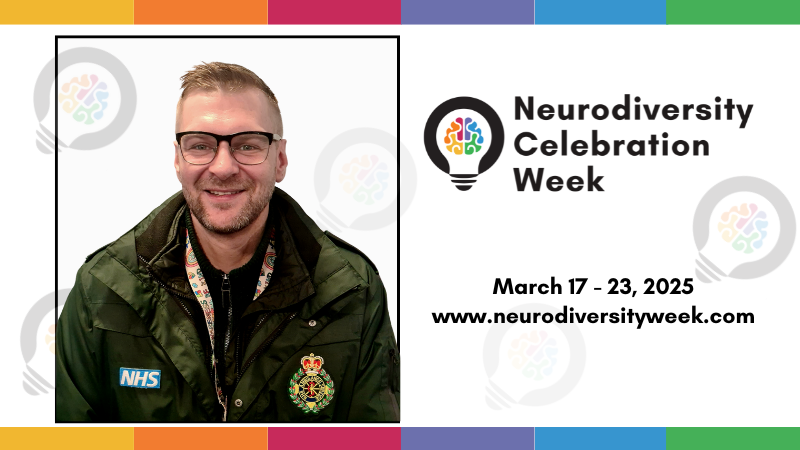
To support it, we are sharing stories from some of our colleagues showing how their neurodiversity affects their jobs and describing some of the challenges they’ve faced.
Specialist Practitioner James Bruce is also one of our Neurodiversity and Autism Champions. He says, “Growing up in rural south Shropshire, it’s fair to say I had somewhat of a sheltered upbringing. Both my parents worked in the NHS, and from a young age, I remember being interested in healthcare and helping others.
“I would listen to my parents come home and talk about their day at work. I remember being in awe of their stories. My dad, who was an operating department practitioner, worked in theatres and would tell me stories of obstructed airways, multiple car road traffic collisions and massive trauma. This planted a seed in me, which influenced my decision to join the ambulance service.
“Sadly, during my time at school, I was the focus of a brutal and prolonged campaign of bullying. This led to me making an attempt to take my own life, not a serious attempt, more a cry for help, but nonetheless traumatic for a 14-year-old. Thankfully, things improved after this, and I was able to focus on my studies.
“When I was young, I faced a number of challenges following a diagnosis of dyslexia and dyspraxia. I struggled to learn the basics, and when I left school, I still couldn’t read or write. Thankfully, I went to an extremely good college that was very supportive. Over the years, I have had many people help me, from teachers and teaching assistants to my parents. Without their support, I would have struggled to achieve my dream of becoming a paramedic.
“My experiences gave me a keen sense of compassion and sympathy for others in similar situations. Whether it’s a patient having a bad day or consoling a relative, these experiences have enabled me to deliver compassionate and patient-centred care. I qualified as a paramedic in 2011, where I worked until a few years ago when I felt it was time to try something new and apply to become a specialist practitioner.
“In recent years, I have tried getting my own assessment for ADHD and Autism, so I know just how hard it is to get an ADHD and Autism assessment. However, as an organisation, we’ve made massive strides to improve the working environment for our neurodiverse colleagues. This is great to see and something I am passionate about, which is why I decided to become a neurodiversity and autism champion.
“If I have one bit of advice for other people out there facing similar challenges. Speak to your colleagues. It’s really unhealthy to sit on these concerns. If you are struggling, you can approach your line manager and request further support.”